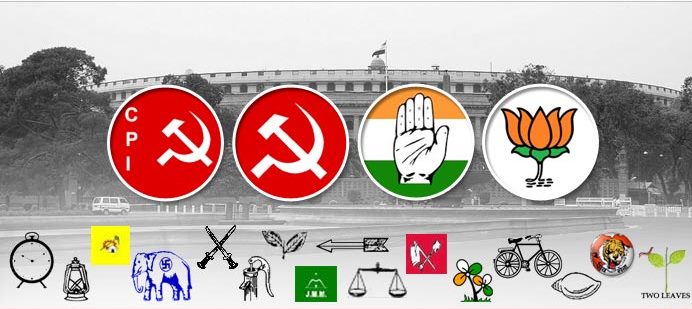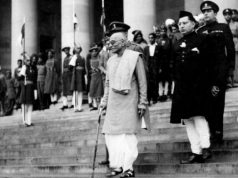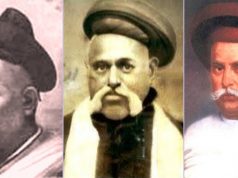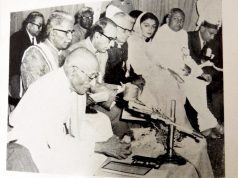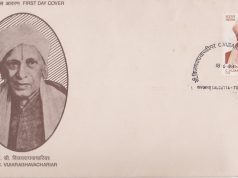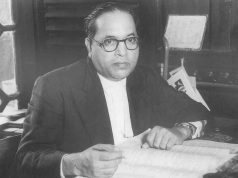Philip Spratt (1902-1971) was an intellectual and writer. In 1926, he arrived in India from Britain at the age of 24 to spread Communism and was one of the architects and founding-members of the Communist Party of India. Subsequently, he renounced communism and moved towards liberalism, and was one of the lone voices against the leftist tendencies that became prevalent after independence. A frequent contributor to ‘Freedom First’, he was associated with C Rajagopalachari and served as an editor for Swarajya. In this piece published in the December 1952 issue of Freedom First, Spratt talks of what he perceives to be the merits and failings of major political ideologies–Liberalism, Marxism and Gandhism. The piece is representative of his thinking at that time, before he had fully embraced Liberalism.
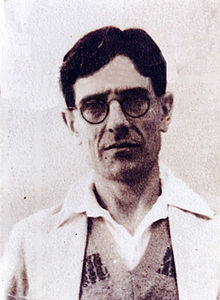
Should a political party have an ideology? Of course. What sort of ideology should it be? That is the question.
Political bodies can be arranged in a series according to the significance of their ideology. At one end stand the parties in the fullest sense, the organised expressions of great historical movements; at the other merely ad hoc associations, coalitions or blocs. The most temporary bloc has at least one point of common policy, but unless its constituent parties agree on more than the immediate purpose, people are apt to denounce it as “unholy”-unprincipled-and its working is apt to be uneasy. Any more permanent organisation is inevitably more united than such a bloc, and to that extent it has an ideology.
A party which aspires to rule a country must have something which can be called an aim in view, even if it is only to keep things as they are; and it must have some idea how it hopes to get there, or stay there. An ideology is nothing else but an aim and a method of getting to it; the rest is frills, quite likely unnecessary, and often dangerous.
Consider some well-known ideologies. The Liberal theory proclaimed a vision-of men, free and equal, going about unrestrained by States, sufficiently rational to see that the interest of all in the maintenance of ordered freedom is the interest of each individually, and sufficiently self-controlled and benevolent to behave accordingly. The aim is abstract enough to be called ethical rather than political. The liberal political method, democracy, change by agreement, etc. follow from these generalities.
Liberalism also had a specifically economic element: that concerning the rights of property, free trade, and so forth. The liberal economic policy purported to follow logically from a universally valid theory, and this theory was the most interesting intellectual and “ideological” part of liberalism; but we all know now that it was hardly more than a disguised appeal to self-interest. In the early days both the ethical and the economic, the altruistic and the selfish, elements were needed to inspire a movement with real drive. But the economic policy proved inappropriate, soon in some countries, eventually in all. Their obstinacy in clinging to their economic dogma doomed the liberal parties to extinction, but the ethical vision of liberalism retains its validity
Consider Marxism. It also proclaims an ideal vision, of men equal, freed from economic subservience, from poverty and from national narrowness and religious obscurantism, freely cooperating in economic and cultural construction. It also has an economic political or sociological theory, all about the concentration of capital, crises, class struggle, etc., so delightful to the ideologist that he entirely forgets the ideal. Marxism frankly avowed that the attraction of the ideal was not enough to inspire a strong party, and appealed to the self-interest of labour, but we now know that no less important was the disguised appeal to the self-interest of the intellectuals contained in that fascinating theory.
Of Marxism it is also true that its ideal or ethical element largely retains its validity, and indeed is not so very different from the liberal ideal; while the sociological element has become out of date. Communists would deny this, but it is quite clear to the outsider that their movement is not now guided by Lenin’s classical formulation of revolutionary Marxism. Social-Democrats would also deny it, but at least it was strongly borne in upon me when I read Sternberg’s Capitalism and Socialism on Trial recently that the Social-Democratic version of Marxism has failed to grapple theoretically with events since about the first world war.
Gandhism similarly puts forward an ideal, in which the main features are equality, free cooperation, local self-sufficiency, decentralisation, a rural, anti-industrial bias, demand limited by self-restraint, and a strong religious inspiration. Its political element, the method of truth and non-violence, is less theoretical than in Marxism, and is related to the ideal in the same sort of way as political democracy is related to the ideal of liberalism. Where liberalism and Marxism appealed to self-interest, Gandhism appealed to the sentiment in favour of national freedom, and proved to be so closely bound up with this, that on its attainment the Gandhian movement quickly declined almost to insignificance. But again the ideal element in both object and method retains its appeal.
In these instances of great movements the principle is perhaps unusually clear, but probably the ideas of any party can be analysed in the same way into ideals, including ideally valid methods; appeals, open or disguised, to self-interest; and economic, political or sociological theory, which guides political practice, but is controversial and gets out of date, and contains hidden appeals to sectional interests.
From the party point of view the most important function of theory in ideology is this function-of disguising appeals to self-interest, and thus maintaining the appearance of consistency in what the party says. In liberalism this is perfectly clear, though of course the pure theory of capital has independent interest. In Marxism the open appeal to the self-interest of the workers was always felt to be a blot, and many Marxists apologised for it, inconsistently, by referring to the liberal principle of majority rule and postulating that the workers were a majority. The accusation that the Marxian theory is a disguised appeal to the self-interest of the intellectuals (first advanced 50 years ago by Machajski) has always been felt to be an intolerable insult and if true a final refutation.
There is another popular method of acquiring appeal. That is to go in for what is called practical politics: to forget or neglect theory, and to angle for the support not of one big group but of many small groups one after another. In countries where democratic politics is a familiar institution and people are bored with it, this works very well, though it is apt to produce disasters like Coolidge and Neville Chamberlain.The Congress party is tending towards a policy of this kind, but the Indian public are not yet sufficiently bored, and one wonders uneasily what sort of disaster it will lead to here.
National temperaments differ considerably. All Englishmen, Gladstone said, hate two things: the Pope and a general proposition. Most Continentals have what Englishmen regard as an inordinate respect for general propositions. Aside from temperament, countries which have long enjoyed stability will tend to take abstract principles for granted.
India, newly starting a free political existence, needs to make her abstract principles explicit. If I can judge her people’s temperament, I should say that her educated class are more interested in theory than Englishmen, but less intoxicated by it than Germans or Russians, while the uneducated are of course indifferent to it. All, however, educated and uneducated, are strongly attracted by high ideals, and still more by men who live up to them. (But it is not unfair to say that they are not much worried by a political practice which departs widely from the ideal )
It follows, if this is true, that an Indian political party which wants to get anywhere must stress the abstract, ethical or utopian element in its ideology. (and if it can get an authentic saint for a leader, its fortune is made ). It should give second place to theory, political, economic or sociological, but it should take care that any theory it does profess is not too difficult to reconcile with its professed ideals. Will it not then fail of popular appeal Has not Gandhism collapsed for lack of open or covert appeal to self-interest?
It is not certain. It may be that Gandhism has collapsed since Independence rather because its ideal is not wholly acceptable. The way for an Indian party may be to proclaim an ideal which is worthy, and yet is free from elements which are merely idiosyncratic and out of date, and for the rest to stand not on theory but on truth: the truth that progress towards any ideal must be slow, and must involve hard work, hard thinking, and honest administration; and to promise that effort and honesty ( relying upon the Indian public’s merciful indulgence towards normal lapses from the ideal) would be rewarded.
The stress on theory in political ideologies is dubious both morally and intellectually. Priority for the ideal aim is logically sounder, and would raise Indian politics to a higher moral level. Whether it could appeal to the electorate can only be found out by trying it.
To access the complete piece, click here. Visit indianliberals.in for more works by Indian Liberals dating back to the 19th Century.
Post Disclaimer
The opinions expressed in this essay are those of the authors. They do not purport to reflect the opinions or views of CCS.

